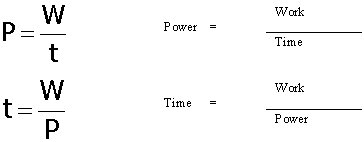|
MODULE V |
|
|
MODULE V |
|
3. Electrical work, power, efficiency
3.1 The electrical work
| Measurement unit |
Ws
|
Watt-second
(James Watt, English Engineer, 1736-1819) |
| Measurement unit |
J
|
Joule
(James Prescott Joule, English Physicist, 1818-1889) |
| Unit symbol | W | Work |
If an electric
circuit is closed electrons are flowing. The resulting electrical energy can
be used. If e.g. a water pump motor forms part of the closed electric circuit
as a resistor, then electric energy is converted into mechanical energy. The
motor is pumping heating water and doing so it performs a mechanical work.
The pump has to be supplied with electric energy in order to work. Such a use
of electric energy is also called "electricity consumption" (however, more appropriately
would be "electricity use").
The mechanical work that results from the electricity use is the product of
electric power and consumption time. So, the electric work depends on the consumed
electric power and on the time of the power consumption. That means that the
bigger the electric work is the bigger has to be the power consumption and the
longer the power consumption has to take place:
The following formula applies: Work = Power * Time

